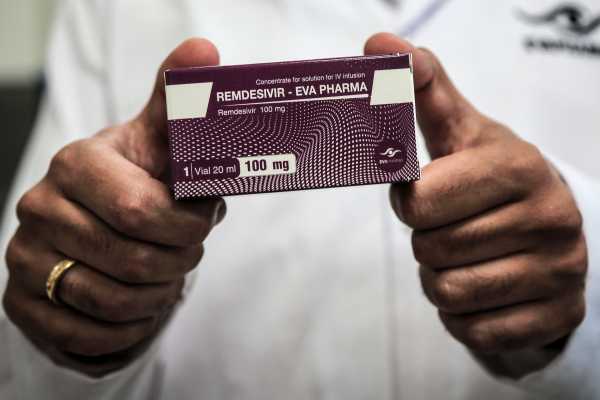
Remdesivir, the antiviral drug that appears to reduce the recovery time for hospitalized Covid-19 patients, has a price tag: $3,120 for the typical five-day regiment for a patient on private insurance. Gilead, the drug’s manufacturer, announced the news on Monday.
The drug has been one of the most promising treatments, reducing the hospital stay for Covid patients by several days in early trials. Remdesivir has been around for a while, but, as you might recall, drug discovery experts have always thought this was the most promising avenue for an effective treatment to come on the market quickly: repurposing an existing drug to fight Covid-19. The Food and Drug Administration authorized the emergency use of remdesivir in May.
But here in America, where even people who have health insurance coverage can often face high medical bills, the news of the drug’s promise was quickly followed by the question: Yeah, but what’s it going to cost?
Now we have an answer — or the start of one, at least. Let’s get into it.
How much are patients going to pay for remdesivir?
As the Wall Street Journal covered, the sales price to hospitals will be about $5,700 for a private insurance patient getting the longer 10-day course, and that $3,120 price tag for the shorter one. For patients covered by Medicare and other government programs, the price will be a little bit lower: $2,340 for the shorter treatment and about $4,300 for the longer one.
If you’re experiencing some sticker shock, don’t panic — too much. These are the prices at which Gilead is selling the drug to hospitals. Patients will generally not be asked to pay the sticker price, although their out-of-pocket costs will depend on their health insurer. (Uninsured patients are supposed to have their costs covered by the government, although there are questions about whether enough funding is available.)
Medicaid patients will be asked to pay very little, if anything. Medicare patients will have their treatment covered by the program’s inpatient benefit, which has a $1,400 deductible before costs are fully covered. Deductibles vary for people with commercial health insurance, but because of the ACA, there is a hard cap (about $7,300 per person) on annual out-of-pocket costs.
So the bad news is, if you are in the hospital for Covid-19, the cost of your medical care is likely to exceed those limits. Your bills would include not only any drugs you might receive, but also room charges, doctor fees, etc. Those typically add up to thousands of dollars on their own.
But the good news is, because those out-of-pocket limits are in place, you won’t bear the full brunt of those costs. The addition of remdesivir shouldn’t add much to your bottom line if you’re already being hospitalized.
“In effect, this is good news for patients,” Stacie Dusetzina, a health policy professor at the Vanderbilt University School of Medicine, said. “There’s a treatment option, and if they find themselves in this scenario, at least this won’t add a huge amount of additional spending to them.”
Why is Gilead setting remdesivir prices like this?
While patients might side-eye the price tag for remdesivir, Gilead’s pricing strategy could also be a headache for hospitals.
For one, Peter Bach at Memorial Sloan Kettering pointed out to me, it’s not at all clear how Gilead will charge separate prices for government insurers and private ones. Hospitals buy drugs in bulk, without knowing which patients are going to receive them.
“The cynic in me thinks there’s two possibilities,” he said. One: “Gilead didn’t think through this.”
But the second possibility is “that this is a strategy.”
Medicare generally pays hospitals one bulk amount for each diagnosis. But sometimes, it creates a separate line of payment — known as a “new tech add-on payment,” or NTAP — for new treatments. This has happened before with novel cancer therapies.
So Gilead could be hoping the Trump administration, enticed by this discounted price, will set up an NTAP for remdesivir. Otherwise, hospitals would be asked to absorb the cost of remdesivir as part of the bundled payment they already receive from Medicare. That could discourage them from prescribing the drug to as many patients as possible, which would hurt Gilead’s bottom line and could, of course, hurt those people.
And no matter what happens with Medicare, the same problem is likely going to occur with Medicaid patients.
That’s because Medicaid payment rates for a hospital stay — which, as with Medicare, cover all the necessary services — are typically set in advance, and when those rates were established for 2020, nobody knew that the Covid-19 pandemic would happen or that remdesivir would prove to be an effective therapy.
Edwin Park at the Georgetown Center on Children and Families told me that hospitals could be made whole on the back end. With the new hepatitis C drugs, the same situation played out: A novel treatment came on the market that hadn’t been accounted for in the Medicaid program’s budgeting.
“They got retrospective adjustments,” Park said, though, “sometimes it took several years.” With hospitals already facing a crunch because of postponed elective surgeries, this won’t make keeping their finances afloat any easier.
It is a reminder of US health care’s rickety patchwork system for valuing and paying for prescription drugs — though, I was surprised to learn, the experts I spoke with thought the price Gilead arrived at is actually pretty fair.
Is this a fair price for remdesivir as a Covid-19 therapy?
This was the bottom line for Dusetzina: “I think this is a reasonable price and it’s a surprising price.”
We’re so used to price-gouging headlines, in an American system that enables drug companies with monopolies to charge whatever they want, that “reasonable” certainly is a surprise.
The simplest way to look at it is the Institute for Clinical and Economic Review’s estimates of remdesivir’s value as a Covid-19 treatment. ICER has come under criticism from drugmakers (perhaps no surprise), but it is maybe the closest thing we have to the kind of independent arbiter of a drug’s value that other countries like Australia have set up within their government health systems.
ICER estimated that if you account for the recent results showing another drug called dexamethasone reduces Covid-19 mortality and is therefore likely to become part of the standard of care, remdesivir has a cost-effectiveness price benchmark between $2,520 and $2,800. Gilead’s topline price was about $3,100. That’s pretty close to the ICER number, especially as US drug prices go.
The value proposition is pretty simple: Patients will spend less time in the hospital. I asked about the possibility of patients being kept longer to finish the remdesivir course if they would have otherwise been sent home earlier, but Bach told me that, thinking of the situation as a clinician, “if it’s reducing viral load, it’s a good thing.” He said it would be “pretty normal” to keep a patient under those circumstances — even if they said they felt well enough to leave.
There could be a number of reasons Gilead set a price lower than some analysts expected. It might want to build some goodwill with the public. It probably would have been a public relations catastrophe to come in with a price that is seen as high for an effective treatment to stave off a pandemic that has killed more than 125,000 Americans and shut down much of the economy.
“If you come out and you price really aggressive high pricing here, you are gonna be in the crosshairs of the entire American public,” Dusetzina said “The president, everyone.”
Dexamethasone also might have played a part, because its clinical results are even more impressive than remdesivir’s. The latter reduces recovery time by a few days; the former reduced deaths by one-third in ventilated patients.
Knowing it had another competitive product likely coming on the market, and that hospitals are feeling a financial squeeze because of the issues described above, it may have behooved Gilead to set this “reasonable” price of its Covid-19 therapy. Competition had the desired effect.
Still, value is all relative and America still has the highest drug prices in the world. Now the country’s private insurance patients will face the highest price for remdesivir. And while their insurance benefits will limit their out-of-pocket obligation, the bill they receive in the mail, the whole system is still absorbing that price.
America does not have the kind of system that other countries do to extract the maximum value for a drug. If Gilead delivered remdesivir at a reasonable price, thanks to this confluence of PR and competitive pressure, it is really an exception to prove that rule.
“We are still paying for it. It’s just through a chain of various intermediaries. It’s still all our money being leached out of our economy,” Bach told me. “Your taxes are gonna go up, your benefits are gonna get skinnied, your grandkids are going to take on more debt. We’re talking billions of dollars here.”
This story appears in VoxCare, a newsletter from Vox on the latest twists and turns in America’s health care debate. Sign up to get VoxCare in your inbox along with more health care stats and news.
vox-mark
Sign up for the
newsletter
VoxCare
Email (required)
By signing up, you agree to our Privacy Notice and European users agree to the data transfer policy.
For more newsletters, check out our newsletters page.
Subscribe
Support Vox’s explanatory journalism
Every day at Vox, we aim to answer your most important questions and provide you, and our audience around the world, with information that has the power to save lives. Our mission has never been more vital than it is in this moment: to empower you through understanding. Vox’s work is reaching more people than ever, but our distinctive brand of explanatory journalism takes resources — particularly during a pandemic and an economic downturn. Your financial contribution will not constitute a donation, but it will enable our staff to continue to offer free articles, videos, and podcasts at the quality and volume that this moment requires. Please consider making a contribution to Vox today.
Sourse: vox.com






